Ongoing development of teams’ motivation

Objective
The development of self-sufficient, responsible staff
Opportunity
To encourage the professional and personal growth of employees along with the development of the business
Material issues
15. Working practices
16. Attraction and retention of talent
17. Development of human capital
30. Dialogue with and commitment to the stakeholders
Inditex has closed 2013 with a total payroll of 128,313 employees. Of these, 7,999 are net incorporations this year, with an increase of 6.6% over 2012. In Spain alone, at the close of the year the Group employed 40,184 people, 1.8% more than the previous year. 78% of the employees are women, compared to 22% men. The average age of staff in 2013 was 32 years.
Evolution of the number of employees in the Inditex Group
| Year | Employees |
| 2009 | 92 301 |
| 2010 | 100 138 |
| 2011 | 109 512 |
| 2012 | 120 314 |
| 2013 | 128 313 |
By area of activity, 87% of the staff work in the Group stores over the five continents. This is a slight increase over the previous year. By contrast, the percentage of workers performing tasks in the logistics area fell slightly (from 7% in 2012 to 6% in 2013), which indicates a better use and greater efficiency of resources in this area in providing service to the Group’s stores.
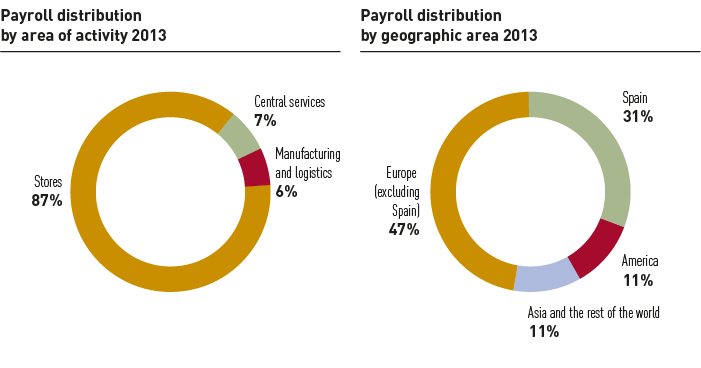
A third of the payroll is in Spain, whereas the rest of Europe accounts for 47% of Inditex’s total employees. Asia and the rest of the world and America share 11% of the total number of workers in each case.
Distribution of the Inditex Group payroll by markets
| EUROPE | |
| Germany | 4 551 |
| Austria | 970 |
| Belgium | 1 894 |
| Bosnia-Herzegovina | 96 |
| Bulgaria | 527 |
| Croatia | 669 |
| Denmark | 104 |
| Slovakia | 190 |
| Spain | 40 184 |
| Finland | 175 |
| France | 7 311 |
| Greece | 3 020 |
| Holland | 1 440 |
| Hungary | 714 |
| Ireland | 743 |
| Italy | 5 567 |
| Kazakhstan | 377 |
| Luxembourg | 141 |
| Macedonia | 122 |
| Monaco | 41 |
| Montenegro | 101 |
| Norway | 152 |
| Poland | 4 272 |
| Portugal | 5 505 |
| United Kingdom | 4 595 |
| Czech Republic | 395 |
| Romania | 1 787 |
| Russia | 8 307 |
| Serbia | 407 |
| Sweden | 535 |
| Switzerland | 951 |
| Turkey | 3 619 |
| Ukraine | 1 058 |
| Total Europe | 100 520 |
| AMERICA | |
| Argentina | 831 |
| Brazil | 2 673 |
| Canada | 1 300 |
| Chile | 751 |
| United States | 3 250 |
| Mexico | 4 532 |
| Uruguay | 222 |
| Total America | 13 559 |
| ASIA AND THE REST OF THE WORLD | |
| Australia | 751 |
| Bangladesh | 44 |
| China | 6 348 |
| South Korea | 998 |
| Hong Kong | 1 173 |
| India | 675 |
| Japan | 3 391 |
| Macao | 183 |
| Morocco | 2 |
| South Africa | 233 |
| Taiwan | 436 |
| Total Asia and the rest of the world | 14 234 |
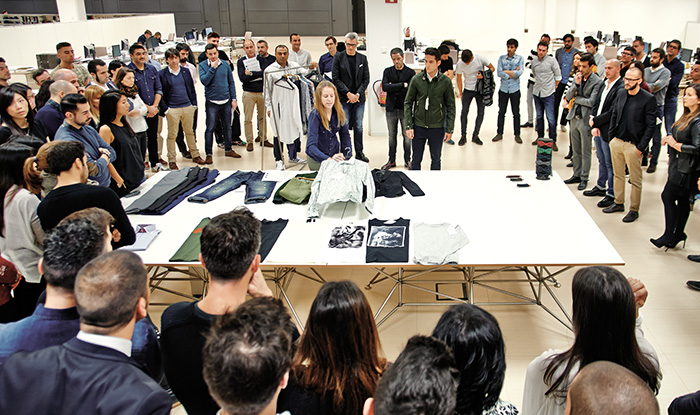
Training, promotion and retention of talent
The more than 6,300 stores with which Inditex ended the year 2013 employ almost 90% of the employees of the Group. This is the reason why the principal challenge facing the company is that of retaining and developing the talent of these employees. The promotion of the staff in the stores occurs mainly in two forms: the development of a career in the commercial structure or transfer to one of the purchasing centres in the Group’s brands.
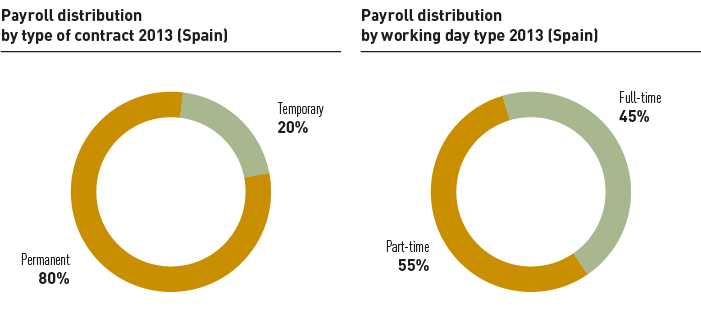
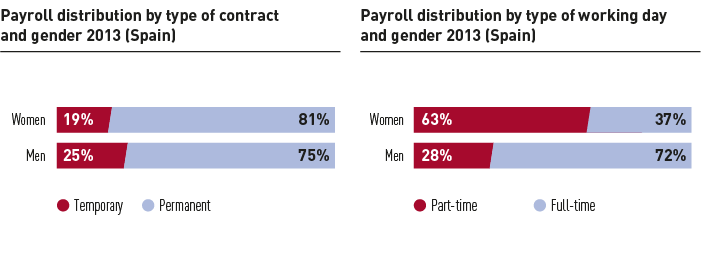
In the case of the purchasing centres, 39% of the staff come from internal promotion and, most of these, from a store. To identify and develop the potential of store staff for internal promotion opportunities, in 2013 the ZARAGO! Programme was set up and implemented in Italy, France and Poland.
Inditex also runs programmes in several countries to identify talent in stores. These programmes are adapted to the specific needs and situation of each country. In 2013, 451 people formed part of the programme in France. A third of these (153) have already been promoted to a management level post in the country. In Poland, more than 220 people form part of the programme and 77 have already improved their position within the company.
In addition to creating development plans, Inditex also strives to guarantee technical training or capacity building for its staff. In 2013, the Group devoted more than 850,000 hours to training its employees. The Efashion online programme, a course on management of the fashion business, had more than 250 participants in 2013.
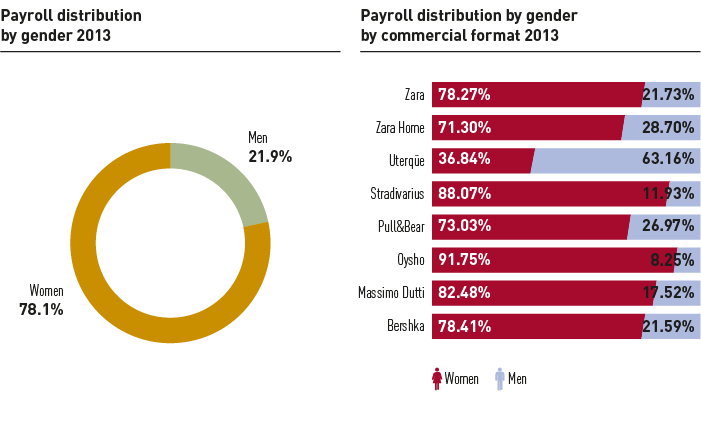
Hours of training per country (*)
| Country | Total received hours | Number of employees |
| Canada | 26 644 | 1 300 |
| China | 30 266 | 6 348 |
| France | 22 005 | 7 311 |
| Hong Kong | 11 946 | 1 173 |
| Ireland | 14 433 | 743 |
| Italy | 12 363 | 5 567 |
| Japan | 4 462 | 3 391 |
| Mexico | 1 376 | 4 532 |
| Poland | 7 008 | 4 272 |
| Portugal | 243 651 | 5 505 |
| Romania | 3 256 | 1 787 |
| Russia | 36 114 | 8 307 |
| Scandinavia (***) | 1 484 | 966 |
| South Korea | 5 344 | 998 |
| Spain (**) | 218 616 | 33 737 |
| Taiwan | 2 008 | 436 |
| Turkey | 23 352 | 3 619 |
| United Kingdom | 187 697 | 4 595 |
| TOTAL | 852 025 | 94 587 |
(*) Does not include all countries where the Group is present. Training hours received from 1 January 2013 to 31 December 2013.
(**) In the case of Spain, the hours of training included are only those corresponding to paid training, excluding the staff of logistics centres.
(***) Scandinavia includes Sweden, Norway, Denmark and Finland
For Portugal and United Kingdom, the figure includes the initial training received at the job position for store positions.
Attraction of talent
The Inditex Group continues to support its JoinFashion platform as a corporate emblem of its recruitment strategy. In 2013, Inditex worked to adapt this platform to local realities by maintaining its recruitment philosophy through two initiatives: The Hong Kong Talent Tour and We Seek Fashion Lovers.
The Hong Kong Talent Tour sought to present the JoinFashion brand in China, and a six-week programme was developed with a local recruitment centre to this end. This centre served not only to recruit new candidates, but also gave Inditex employees in Hong Kong the opportunity to get a closer look at the company they work for. In the case of the second project, the aim was to cover the same objectives, but in Germany. To this end, two recruitment events were held in Frankfurt and Munich.
Recruitment and training centres continue to be a pillar for guaranteeing the selection of the best professionals in cities with high recruitment rates where the aim is to consolidate Inditex’s presence. In 2013, two new employment centres were opened in Turkey and Mexico, in addition to the seven already up and running and which have already been attended by more than 200,000 people.
In 2013, Inditex continued to consolidate its presence on the social networks. One example of this was the creation of its own JoinFashion wall on Facebook which allows the company to speak directly to candidates. At the end of the year, the Group had almost 150,000 followers on LinkedIn.
Commitment
Inditex maintains its clear commitment to equal opportunities between men and women and non-discrimination, which began 2006 when the company ratified the EQUAL Diversidad Activa (Active Diversity) project co-financed by the European Commission and directed by the Spanish Coordinator of the European Women’s Lobby and the Fundación Carolina.
Since 2007, with the enforcement of the Equality Law, Inditex has started an exhaustive process of analysis to implement equality plans in each of the Group’s companies.
In 2013, Inditex finalized Oysho España S.A.’s equality plan and negotiations began on Stradivarius España S.A.’s equality plan. These plans can be added to those of the other Inditex companies already approved in previous years.
Follow-up meetings have been held every six months in Zara España, Massimo Dutti, Pull&Bear España and in the company’s logistics centres in order to verify compliance with and implementation of equality plans. In addition to the 15 Inditex people certified as Equality Agents, another four people with responsibility in the Group companies joined the certification process.
Inditex is continuing with its firm commitment to equality and non-discrimination in 2014 by negotiating and promoting quality plans in the remaining brands, including Bershka BSK España S.A., Stradivarius España S.A., Tordera Logística, Uterqüe, Zara Home España S.A., as well as ensuring compliance with the integration of the people with disabilities.
Remuneration policy
There are general criteria of action which are common to all of the areas of activity that adapt to each market and working environment. Within these general criteria, it is worth noting that Inditex has made continual efforts to promote variable pay in order to link wages to the results of the company, from the store employees to the employees in the Group’s central services.
Staff expenses 2013
| (thousands of euros) | 2013 | 2012 | Var. % |
| Fixed and variable wages | 2 217 084 | 2 098 490 | 5.7% |
| Inditex contributions to Soc. Security | 480 650 | 449 220 | 7.0% |
| Total staff costs | 2 697 734 | 2 547 710 | 5.9% |
Prevention of Occupational Risks
In the field of worker health and safety, in 2013 OHSAS 18001 certification was completed in all logistics centres and factories of the Inditex Group in Spain. With respect to the stores in Spain, this certification will begin to be implemented in Zara, Pull&Bear and Zara Home in order to achieve certification in 2014.
The Inditex Group logistics platforms concentrate the large part of training activities in the area of preventing muscular and skeletal injuries. In 2013 more than 1,700 workers were trained in this discipline. There follows a breakdown of the different training programmes according to the logistics centre where they were held:
- Zara Logistics: Course on the prevention of muscular and skeletal injuries. Some 200 workers received 4 hours of theoretical and practical training on fundamental notions of the human body’s biomechanics, breathing as an engine of movement, post-isometric stretching, overall stretching of the different areas of the body, healthy posture, education and balance, coordinated muscle activity and occupational ergonomics.
- Massimo Dutti Logistics: Back school. 148 workers attended a training session of 4 hours of theory and practice.
- Oysho Logistics: Back school. 140 workers attended a training session of 4 hours of theory and practice.
- Zara Home Logistics: A course for preventing ergonomic risks including a theoretical preventive technical module and a practical health module with exercises to be performed by workers. The course lasted 6 hours and 29 employees were trained.
- Meco Logistics Platform: A course for preventing ergonomic risks including a theoretical preventive technical module and a practical health module with exercises to be performed by workers. The course lasted 6 hours and 415 employees were trained.
- Europe Platform: Healthy posture in manual work at tables. 31 people received training on basic knowledge in order to learn to adopt correct postures, to perform movements in the right way and to avoid muscular fatigue. Furthermore, 438 people received theoretical and practical training in handling loads and stretching.
- Tempe: Back school. On the reception course, more than 320 people were trained in subjects related to back pain and its prevention.
In 2013, the Occupational Risk Training Course for Inditex Group stores in Spain was updated to include a specific chapter on training and recommendations on ergonomic risks. This course was imparted to more than 14,000 workers in stores in all of the brands.
In 2013, different actions were also performed in relation to worker healthcare, including a global campaign in the work centres with recommendations on healthy habits and training programmes to encourage workers to care for their bodies and to promote physical activity in and out of work and a healthy diet. A total of 191 workers were trained in these areas.
Occupational accident rates and average duration of sick leave 2013 (Spain) (*)
| Central services | |
| Accident rate (‰) | 3.72 |
| Average sick leave duration (days)) | 76.8 |
| Stores | |
| Accident rate (‰) | 31.78 |
| Average sick leave duration (days) | 18.99 |
| Design | |
| Accident rate (‰) | 12.46 |
| Average sick leave duration (days) | 35.43 |
| Logistics | |
| Accident rate (‰) | 96.75 |
| Average sick leave duration (days) | 21.37 |
| Manufacturing | |
| Accident rate (‰) | 89.73 |
| Average sick leave duration (days) | 40.35 |
(*) Accident rate = number of accidents with sick leave / average staff

Volunteer Force
Inpulse
In 2011, Inditex created the Inpulse portal as a corporate web platform for its workers, where they can find information on Corporate Social Responsibility initiatives carried out by the Group, as well as different kinds of actions in which they can get involved as volunteers.
2013 saw the second edition of The Big Idea Project: an opportunity for those employees who, with the support of non-profit institutions, decided to present their own initiative, seeking to gain the financing and volunteering time to implement it. This second edition extended its presence to four new countries, in addition to Spain: Germany, United States, Poland and the United Kingdom. Within the framework of The Big Idea Project, 20 projects were developed in 2013 with more than 1,000 direct beneficiaries to which Inditex conceded more than 2,000 hours of volunteering and over €400,000 in funding.
Integration
In compliance with the Law on the Social Integration of the Disabled (Ley de Integración Social de Minusválidos, LISMI) applicable in Spain, in 2013 Inditex directly hired a total of 299 people with a degree of disability of 33% or more, both in its different brands and in its logistics platforms. Furthermore, with the authorisation of the Ministry of Employment and Social Security, it contracted services with special employment centres with a total equivalent to contracting a further 217 workers with disabilities. Furthermore, the Group’s different brands made donations to associations and foundations (involved in the integration of the people with disabilities into the labour market) amounting to more than 55,000 euros, equivalent to contracting 5 workers from this group.
Stylepack Project
Since 2010, the Inditex logistics centre in Zaragoza has housed a special employment centre (Stylepack) employing 30 people with physical and mental disabilities. The workers, who are constantly supervised by two monitors, are mainly involved in garment relabeling activities.
for&from Project
The for&from project aims to integrate the people with disabilities by creating a network of stores, in collaboration with social entities, under the form of an Inditex franchise. The Group supplies previous seasons’ clothing items which are sold at competitive prices by these organisations.
At the present time, the for&from integration programme has seven commercial establishments in Spain in collaboration with four social economy institutions: Fundación Molí d’en Puigvert, Confederación Gallega de Personas con Discapacidad, Asociación Pro-Discapacitados Psíquicos de Alicante and Moltacte. These all provide stable employment to 56 people with disabilities.
In 2013, Oysho opened its first for&from store in Palafolls in collaboration with Fundación Molí d’en Puigvert, which is attended by people with severe mental disorders.
Similarly in 2013, Bershka modified the location of its for&from store in Palafolls in order to increase its area and improve the installations’ accesibility in order to move forward in its aim to employ people with disabilities.
Data for&from stores 2013
| 2013 | 2012 | Variation | |
| Sales (in euros) | 3 647 189 | 2 978 504 | 22% |
| Store surface (m2) | 1 077 | 957 | 13% |
| Sales/m2 | 3 386 | 3 112 | 9% |
| No. of employees with disabilities | 56 | 48 | 17% |
Jeunes and Salta Projects
The Jeunes Project was created in France in 2008, which aims to promote the employment of disadvantaged young people in the Paris metropolitan area. Shortly afterwards and with the same aims, the Salta Programme was launched in Spain, a social initiative offering training opportunities and integration in the world of work for young people at risk of social exclusion.
In 2013, Zara France, in collaboration with the Force Ouvrière trade union, held the thirteenth edition of the JeunesProject. The two calls for applications made this year have brought in a total of 30 youngsters as employees of Inditex.
Madrid also has seen a new edition of Salta, which incorporated 16 young people as employees at the Group’s stores.
